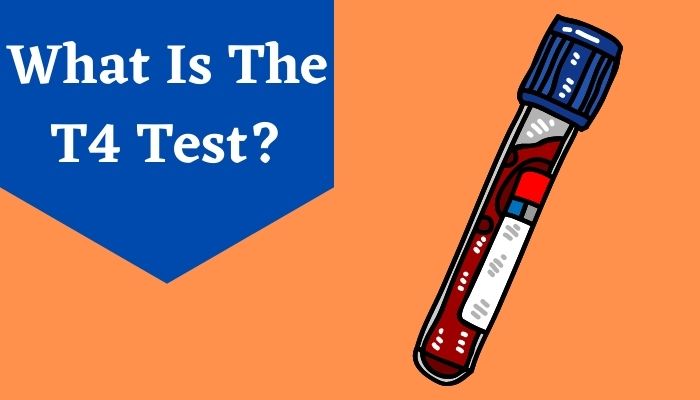A thyroxine or T4 test diagnoses various disorders of the thyroid. The thyroid is a small and butterfly-shaped gland that is present in your throat. This gland produces hormones that control the way your body utilizes energy. This also plays a pivotal role in regulating your weight, body temperature, muscle strength, and even your mood. Thyroxine or T4 is a type of thyroid hormone. The T4 blood test weighs the level of T4 in your bloodstream. Any abnormal value (too high or too low) of T4 can portray that you are having thyroid disease.

The cost of the thyroxine (T4) test is Rs.170 to Rs.250, depending on your location and place. Please check the price of the thyroxine test in Delhi/NCR, your nearby centers and other details.
Summary of T4 Test
| Also known as | Free Thyroxine, Free T4, Total T4 Concentration, Thyroxine Screen, Free T4 Concentration |
| Test Type | Blood |
| T4 test includes | Diagnosis of thyroid disease |
| Preparation | You may need to fast for several hours before the best |
| Reporting | Within 24 hrs |
| Test price | The cost of the thyroxine (T4) test is Rs.170 to Rs.250, depending on your location and place. |
| Also included in | Health Insurance Plans |
| Related tests | T3, TSH |
The T4 Hormone Comes in Two Forms
Free T4: This enters your body tissues where it is requiredBound T4: This fastens to proteins and prevents them from entering body tissues
A test that measures both free and bound T4 is called a total T4 test. Other tests only evaluate free T4. A free T4 test is more accurate and prominent than a total T4 test for checking the functionalities of the thyroid.
Purpose of This T4 Test?
Your doctor may recommend this test if your thyroid-stimulating hormones (TSH) test values come out abnormal. By performing this test, your doctor will understand what kind of problem is affecting your thyroid.Some thyroid disorders could be,
- Hyperthyroidism or overactive thyroid
- Hypothyroidism or underactive thyroid
- Hypopituitarism or underactive pituitary gland
- Eye problems including dryness, irritation, puffiness, and bulging
- Dryness of skin or skin puffiness
- Loss of hair
- Hand tremors
- Abnormal heart rate
- Changes in blood pressure
- Weight changes
- Sleeping difficulties or insomnia
- Anxiety
- Fatigue and weakness
- Intolerance to cold
- Sensitivity to light
- Irregular menstruation
TSH or thyroid-stimulating hormone generates from the pituitary gland. It controls your thyroid to release both T3 and T4. By conducting these tests, your doctor will understand more about your thyroid problem.
Preparation of T4 Test
Your T4 test results may get hampered by a plethora of drugs. If you are taking any medications, inform your doctor about the same before performing the test. To get accurate results, your doctor may ask you to stop the dosage of the medications temporarily. Inform your doctor if you are pregnant.Drugs that hamper your test are
- Androgen, estrogen, and birth control pills
- Medications that are designed to treat cancer
- Steroids
Procedure of T4 Test
- A healthcare provider will tie an elastic band to your upper arm to identify the vein from where he will collect the blood sample.
- Then, he will insert a needle into your vein on the arm.
- Your blood will be deposited into a collection tube.
- After the completion of the sample collection, the needle and the elastic band will be removed.
- The technician will put up a bandage or gauze at the puncture site.
Results of T4 Test
- The total T4 result in adults goes from 5.0 to 12.0 micrograms per deciliter (μg/dL)
- The free T4 result in adults goes from 0.8 to 1.8 nanograms per deciliter (ng/dL)
Interpretation of T4 Test Results
Your doctor can’t conclude or diagnose your condition based on an abnormal T4 result. Thus, he also prescribes T3 and TSH tests to understand the entire picture. Pregnancy may hamper your T4 levels.Abnormally High-Test Results
Elevated T4 levels may indicate hyperthyroidism. There could be some other thyroid problems, like thyroiditis or toxic multinodular goiter.Other reasons for higher results could be
- High levels of protein in the blood
- Excessive iodine
- Too much thyroid replacement medication
- Trophoblastic disease (a rare tumor in pregnancy)
- Germ cell tumors
Abnormally Low-Test Results
Lower levels of T4 may indicate- Dietary problems like iodine deficiency or malnutrition
- Drugs that influence protein levels
- Hypothyroidism
- Illness


